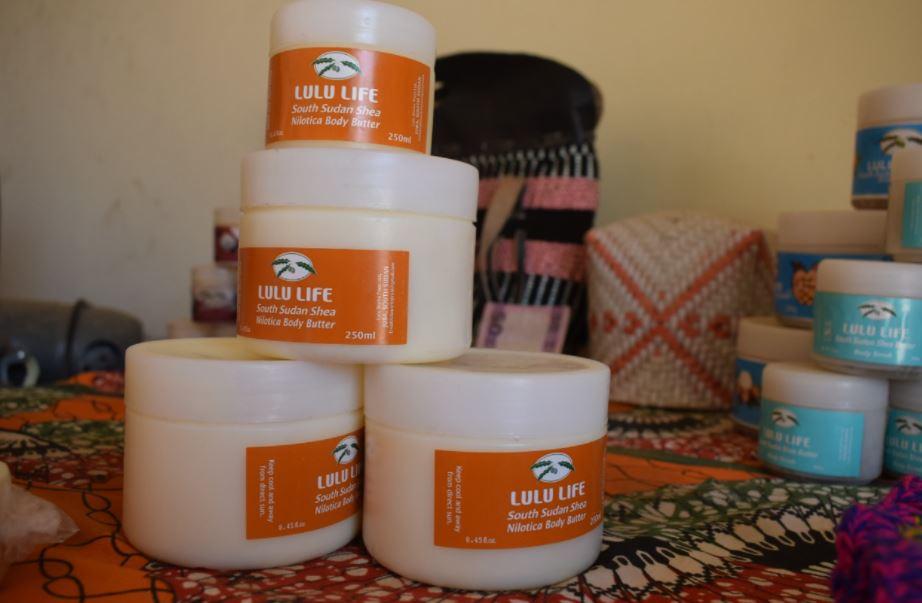Africa-Press – South-Sudan. Lydia Maryam’s story is almost on the confines of grass to grace, or to be precise with facts, she looks destined there.
Her story began in the streets of Juba when she ventured into a cleaning job at Shea Nut-Producing Company to eke out a living, and this later transformed into an inspirational tale.
As a young woman living in the capital, Juba, Lydia worked as a cleaner at Lulu for 12 years, where she learnt the ropes of life. She then developed the urge to move up and venture into production as a young entrepreneur. The journey took her to Shea Butter Production, where she soon discovered that paying attention to the production of shea butter products provided her with far more benefits than just being a cleaner.
“Before I joined, I did not know anything about the products. I came and watched until I mastered the game. I was just a cleaner, “she narrates how she gained the craft.
Maryam gained great experience in making products out of Lulu seeds, as well as the ability to build vital connections that have been helpful in sourcing the raw materials for her trade.
“I get the Lulu nuts from Kajo Keji, through some ladies. Most of the time, they collect the Lulu seeds and send them to me in Juba,” says Lydia.
Processing
She uses shea nuts to make high-value goods such as oil, lip balm, and body lotion, “I make them into different products.”
Once the shea nuts are delivered, she boils them, makes a variety of products out of them, and takes them to the market for sale.
Ms. Lydia gets about SSP 5,000 from selling her shea butter at the local market after two or three days of preparing it.
After picking, she has to crush them, roast, grind, and boil the seeds.
“This is the soap, I mix the Lulu, add some oil, and add toxic soda. That’s how I come up with the soap. This is a very natural soap made from natural products,’’ she demonstrates.
She adds that ‘‘it does not have any side effects and it is made from natural products for all skin types.’’
Ms. Lydia stresses that her products are sold beyond Juba as far as Bahr al-Ghazal, Equatoria states, and other parts of the country.
The Shea nut tree that is commonly known as Lulu in Arabic has is also been used as cooking oil and food.
Lydia, just like many other women in her community, is struggling to support her family by producing and selling shea butter.
“This shea butter I have prepared will be sold to help me pay school fees for my children and also put food on the table for my family.”
Her buyers are mainly people working with international NGOs and local people in the country, though they buy in small quantities.
“My desire is to see my business grow, and my products become even more popular both in the local markets and abroad,” she says.
She says shea butter has seen a growth in popularity as a component in cosmetics, confectionery, and pharmaceuticals in recent years.
Her products travel across the country, abroad, and overseas. However, women like Lydia are not receiving the benefits of Shea in the global market.
Lydia says one of the biggest challenges is a lack of capital to purchase shea nuts in large quantities to broaden her sales to the international market.
“If the products go outside of South Sudan, I am sure more people will buy them and I will start to get more money.”
“I am willing to export these products, but right now I don’t have a passport to take these products,” she said
She adds, “My hope is that one-day security will be improved, I will get the shea nuts in large quantities, and I will grow my business.”
With proper security in the country, ‘‘I will be able to get enough Lulu seeds to make more products and more women will join the business.’’
Despite these challenges, Lydia says she is busy looking around for support from women’s organisations to help empower women to produce quality Shea products.
“The women’s cooperative group needs to be revived so that women can produce shea products on a large scale, targeting the international market.” We also need a social enterprise to make production lucrative for women by working in co-operatives.”
She believes cooperatives will teach women to improve conventional procedures such as nut collecting, processing steps for quality butter, and packaging.
For More News And Analysis About South-Sudan Follow Africa-Press






